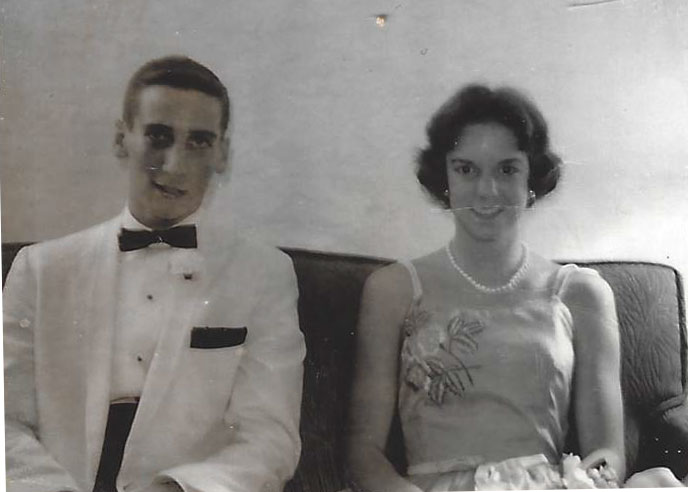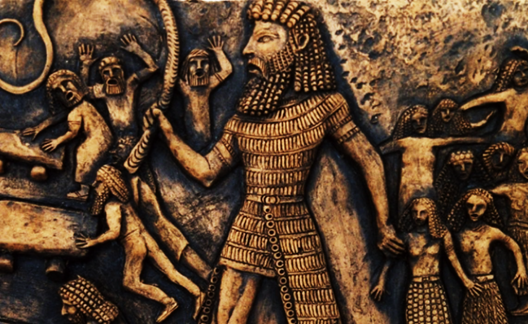It’s All About Feeling Dumb and Poor
This is my second essay regarding Ti Ti’s request for a photo of me when I was a younger version of a debonair, intelligent, suave, cute, and charming PaPa Al. I’m also a dotting grandfather, and whenever Ti Ti needs something, I’ll jump at an opportunity to assist her. However, I’m not sure why she wants photos of me. Perhaps she wants to paper a wall where she is living. As with my first essay, I supplied two photos. The first was my graduation from Mt. Lebanon High School in the South Hills of Pittsburgh. One of my parents wanted me to smile, which I dutifully did. I was lining up for the processional march of the class of ‘61. That’s 1961, not 1861.

The second photo is me with my date for our senior prom, Nancy Nurenberg. My parents wanted a photo of Nancy and me before the prom. When I found this photo in an old photo album, I didn’t look very composed in the picture. However, look at Nancy’s smile. She seemed happy and confident, which said much about who Nancy was.

I found an old movie from our prom. Unfortunately, I couldn’t find us dancing. I do remember dancing to Earth Angel with her. I saw Nancy as my earth angel.
Nancy and I were in the same homeroom at Mt. Lebanon. When school let out, I often walked her home. We spent an hour chatting, although I don’t recall any of our conversations.
Nonetheless, Nancy wasn’t just my earth angel; she was the perfect example of Mt. Lebanon, the wealthiest community in Western Pennsylvania. The town was divided into large neighborhoods. Her parents had a lovely home in Virginia Manor, the most affluent area of Mt. Lebanon. Nancy’s family had money, a lot of it. Nonetheless, she acted like any other student. She was genuinely interested in her classmates and was very kind.
The other parallel between Nancy and Mt. Lebanon was that she was the valedictorian of our class. Being a valedictorian at Mt. Lebanon was prestigious. Mt. Lebanon was ranked 19th best school system in America. Also, Mt. Lebanon was one of the first high schools in the nation to offer advanced placement courses for their high school students. Most of her classes during her senior year were college classes. After graduation, she went to Bucknell University with probably a dozen hours of credits already awaiting her.
Since our time at Mt. Lebanon, I haven’t seen Nancy for over six decades. I assume she was married, had kids, and is enjoying her golden years. If anyone knows Nancy’s whereabouts, send her a link to this article.
This trip down memory lane has raised the question of what’s with Nancy. Why was I attracted to her? Beyond her looks and personality, what fascinated me about her after all these years? I couldn’t explain it until I started writing this article.
Many of my articles, over the years decades, have been based on Carl Roger’s psychotherapy technique. Roger would sit down with his client and begin sessions with open-ended sentences like, “Tell me about you....” The Rogerian technique was a non-invasive approach that enabled the client to begin to express various issues with the therapist. I use that same technique in my essays, but I am both the therapist and the client. Hence, my attraction to Nancy haunted me.
This is one of my psychotherapy sessions. I was born a couple of months before my father was shipped off to the South Pacific during WWII. When he returned home at the end of the war, he wanted to go to college. However, he was married and had a child. He went back to his work dealing with insuring large corporations. Two years later, he was promoted to vice president at the company’s home office. So, the family had to move from Pennsauken, NJ, to Pittsburgh, PA.
My dad purchased a home in Mt. Lebanon because it had excellent schools. Years later, I discovered that Mt. Lebanon was the 19th-best school system in the country and the wealthiest community in Western Pennsylvania. Therefore, I went from an above-average student in a nice middle-class community to the 19th-best school system in the States and an equally rich community.
As a result, Mt. Lebanon taught me two things—I was dumb and poor. Being dumb in Mt. Lebanon meant I mainly got Cs, several Bs, and occasionally an A. All my friends, including Nancy, benefited from starting kindergarten at Mt. Lebanon. I had to scramble from sixth to twelfth grade to get the grades I did. It took me over a decade to realize that I wasn’t dumb or poor.
Reflecting on my relationship with Nancy, I was driven to be accepted academically and financially by a wealthy valedictorian. Talk about being driven. However, to Nancy’s credit, she accepted me. We never talked about money or grades. I was just some nice guy who used to walk her home after class and took her to our prom.
However, Nancy went to Bucknell, and I went to Muskingum, which meant I faced the haunting issue of being dumb and poor alone. My grades at Muskingum were a little better than my high school grades. It wasn’t until my junior year at Muskingum that I began to see the light. Nearly a half-century ago, I had a professor at Muskingum who taught a required ten -hour art history class called The Arts. Students took it in either their junior or senior years. It was divided into five hours per semester. Students attended lectures and subsections.
I took it in my junior year and loved it. The professor, Louie Palmer, asked me to be his teaching assistant during my senior year. I taught several sub-sections weekly and wrote and graded the midterms and finals in both semesters. Until recently, I missed Nancy’s acceptance of me. I didn’t miss Louie’s faith in my abilities. Talk about a golden opportunity. It changed my Weltanschauung. After college, I went to graduate school and post-graduate school. In the past thirty years, I have taught at several different colleges. This is one of my PowerPoint presentations for my art history classes.
Beyond my Rogerian psychotherapy session, what is your takeaway from this article? I hope you will realize that even the smallest contact with each other might be transformative for someone on their journey down the yellow brick road.













